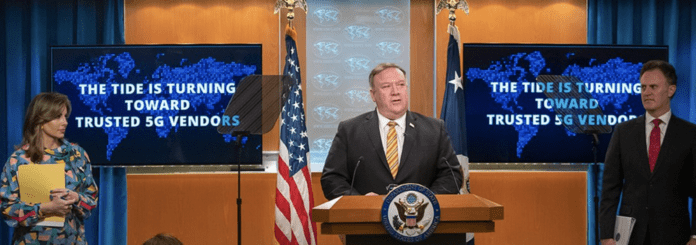US Secretary of State says, “The tide is turning against Huawei…”
The United States government sees Huawei as a security concern both domestically and abroad. This is not a secret. As lawmakers work to replace Huawei equipment in smaller, rural U.S. networks, officials are simultaneously working to convince other states to exclude the Chinese vendor from network buildings. While the talking points have been consistent for years, U.S. Secretary of State Mike Pompeo has recently added a new descriptor: “Clean telcos.”
In a June 24 press statement, Pompeo listed off countries that “are only allowing trusted vendors in their networks,” and specifically called out nations and carriers that selected vendors Ericsson, Nokia and Samsung. “Some of the largest telecom companies around the globe are also becoming ‘Clean Telcos.’ We’ve seen this with Orange in France, Jio in India, Telstra in Australia, SK and KT in South Korea, NTT in Japan, and O2 in the United Kingdom,” according to the statement.
With his characterization of “clean telcos,” Pompeo raises the question of what the opposite would be–presumably a dirty telco–but doesn’t explicitly finish the thought. He does conclude: “The momentum in favor of secure 5G is building. The more countries, companies, and citizens ask whom they should trust with their most sensitive data, the more obvious the answer becomes: not the Chinese Communist Party’s surveillance state.”
Following his June 24 press statement, Pompeo remotely gave a speech titled, “A New Transatlantic Dialogue,” as part of the German Marshall Fund’s Brussels Forum. The Secretary of State begins his remarks by discussing how multilateral institutions have be viewed realistically, not wishfully, and don’t exist as “an end unto themselves.” He then quickly turned his focus to the Chinese Communist Party and its “predatory economic practices, such as trying to force nations to do business with Huawei, an arm of of the Chinese Communist Party’s surveillance state.”
Following his opening remarks, Pompeo fielded questions, one of which asked what specific proof he has linking Huawei to the CCP. He said there are “many things that I can’t share an open setting,” but, “We know that if you go the top floors of Huawei’s commercial building inside of China that there are members of Chinese security apparatus working there.”
He then reiterated a consummate Washington D.C. talking point that Chinese law “requires companies like Huawei to share any information that they have…that information will be in the hands of the [CCP] if the [CCP] deems it necessary to have that information. Huawei has a legal obligation to provide to them.”
Huawei has consistently refuted the claims most recently made by Pompeo and has focused its efforts on pushing for global mechanisms that create supply chain security and the ability for independent equipment testing and assurance.

